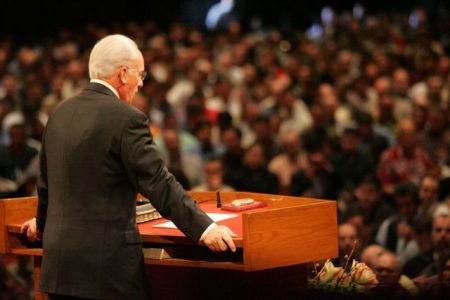Him. Paul summarized his ministry in one word: “Him.” Not “Christ + _________” but Christ as the only focus. All other topics of interest had to fit in around Him and promote Him and make Him clearer. If they didn’t serve that purpose, Paul got bored quickly.
We. Whatever others may do, this is what we do. Whatever message others may shout out, we’ll shout louder about Jesus Christ. We are responsible to Him and will give an account to Him only and finally.
Proclaim. Not beg, as if He were poor. Not suggest, as if He were doubtful. Not propose, as if He were the premise of something larger. But proclaim as the only life that is truly life, accessible to everyone on terms of grace, received with the empty hands of faith, giving all, demanding all.I just think that is so sound.
We will not dishonor the sufficiency of Christ by, in our actions, presenting something more than Him to the world and to each other. We will not present Christ and programs, or Christ and gimmicks, or Christ and coffee houses, or Christ and funny skits and videos, or Christ and rock concerts.
Neither will we dishonor the sufficiency of Christ by parroting the world as we seek to minister the Gospel. We will not market Jesus. We will not market His Church. We will not conform to the pattern of this world as we seek to build each other up in faith and to evangelize the lost. We will not seek to win the world by becoming like the world. And we will not be controlled by the world's felt needs or their opinion of us. We will recognize that we are called out of the world and so will be an aroma of Christ from life to life to His sheep whom He will call according to His sovereign decree. And we will do this by being utterly different than the world around us, just as Jesus was. (The Greek word for 'church' is ekklesia. It comes from two words: (1) ek, meaning 'out of' and (2) kaleo, meaning 'to call.' The Church is made up of the called-out ones.)
Finally, we will not dishonor the sufficiency of Christ by doing anything less than proclaiming Him. I liked Ortlund's examples. We won't beg, and thus make Jesus look poor and needy. We won't merely suggest, and thus make Him look optional. We will not merely invite, or offer, or (the favorite) share. We will proclaim.
The proclaiming, the heralding, the preaching of Jesus Christ and Him crucified is the God-ordained means of accomplishing the ministry He has given to us, both to other believers and to the unbelieving world. The most solemn, severe charge in all of Scripture came from Paul to young Pastor Timothy regarding what his ministry was to be:
in the presence of God
and of Christ Jesus,
who is to judge the living and the dead,
and by His appearing
and His kingdom:
preach the word!
Oh, may we never become more clever than the Word of God!
And may God grant swift repentance to the many thousands throughout evangelical churches today who already have.
according to the tradition of men,
according to the elementary principles of the world,
rather than according to Christ.
For in Him all the fullness of Deity dwells in bodily form,
and in Him you have been made complete,
and He is the head over all rule and authority.
- Colossians 2:8-10 -
For I am not ashamed of the Gospel,
for it is the power of God for salvation
to everyone who believes.
- Romans 1:16 -


